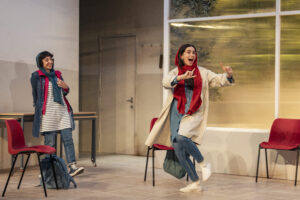Jessica Harris watches a Royal Shakespeare Company production.
A play that relies on the skills of actors rather than on elaborate sets, English is well suited to the intimate space of The Other Place, the RSC’s studio theatre. And its ensemble of five performers, playing a teacher and four Iranian students who are learning English as a second language, comes up to the mark. Each of the characters undergoes a journey over the course of the play, and each actor powerfully conveys a range of emotions, from humility to ambition and from warmth to defensiveness, as their character grapples with a new language and with the others in the class. Moments of comedy are well-delivered as they flounder with unfamiliar words and phrases.

As the play develops, we are taken deeper into the characters’ worlds, their motives for learning English and their hopes for the future. For Roya it will mean she can join her son in Canada and play a part in her grand-daughter’s life. For Elham, it will enable her to get the qualifications she needs to enter medicine and move to Australia. For Goli, it is pure love of the English language that has brought her to the class, whilst in Omid’s case the motives are less clear. His English is already good, he has a green card, and seems able to move between the USA and Iran with ease.
The relationships of the four students to the language itself also plays out, foregrounded by teacher Marjan stating, “I always like myself better in English.” Tensions emerge as the students receive this in different ways, and the focus shifts from language acquisition to the relationship between language and identity, and the love each has for their first language, Farsi. When Marjan says she lived in the UK for 9 years and was called Mary, Roya replies, “Our mothers get to name us, not foreigners!” As their feelings for their first language grow, so Roya and Omid start to question the significance of where they call their home and their plans for voluntary migration.
An interesting piece about learning styles and the relationship between language and identity, the second half of the play feels laboured and over-written. Marjan’s one-to-one conversations with individual students cover similar ground, as she starts to recognise her own loss of identity in trying to bridge both English and Farsi. And, whilst the play counters the narrative that the spread of the English language is necessarily a force for good, it stops short of looking at the relationship between colonisation and the global spread of English.
Marjan was played by Nadia Albina, Goli by Sara Hazemi, Roya by Lanna Joffrey, Omid by Nojan Khazai and Elham by Serena Manteghi.
English was directed by Diyan Zora and written by Sanaz Toossi. It is on at Stratford until 1st June. For further information visit rsc.org.uk
Pics – Richard Davenport (c) RSC.


